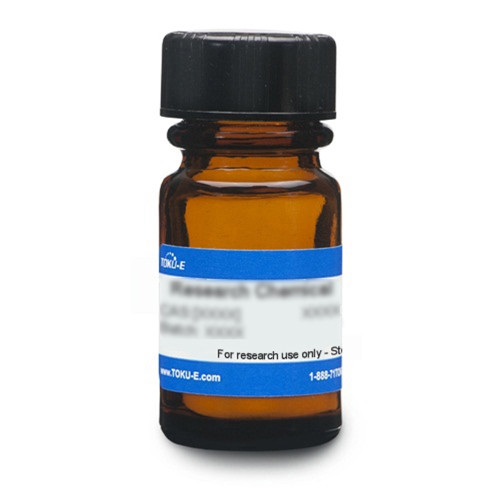Josamycin is a macrolide antibiotic that inhibits protein synthesis. It has anti-cancer properties, as it is able to overcome P-glycoprotein-dependent drug resistance in cancerous tumors.
| Application | Macrolide antibiotics such as Josamycin are useful in studying phagocytosis and cytokine production, immunomodulatory functions, and bacterial protein synthesis. |
| Mechanism of Action | Josamycin inhibits peptide elongation on the ribosome by binding close to the peptidyltransferase center and blocking the peptide exit tunnel in the large ribosomal subunit. Synthesis of full-length proteins is completely shut down by Josamycin. |
| Eukaryotic Cell Culture Applications | Josamycin was evaluated in cell culture with peritoneal cells and splenic cells from BALB/c mice. Phagocytic activity of C. albicans and cytokine production (IL12 and IL-18) by peritoneal cells and IL-4 production by splenic cells was evaluated, and results indicated that Josamycin acts as an immunosuppressive agent (Ortega et al, 2004). |
| Cancer Applications | Josamycin was found to increase the accumulation of vinblastine and cyclosporine A in a dose-dependent manner in anticancer drug-resistant cells (P388/ADR). Since it inhibits the binding of vinblastine and cyclosporine A to P-glycoprotein, it may be used to overcome anticancer drug resistance. In fact, combination chemotherapy with macrolide antibiotics like Josamycin may overcome P-glycoprotein-dependent drug-resistant tumors (Wang et al, 2000). |
| Solubility | Slightly soluble in ethanol, methanol and chloroform. |
| Source | Streptomyces kitasatoensis and Streptomyces narbonensis var. josamyceticus. |
| References | Lovmar M, Tenson T and Ehrenberg M (2004) Kinetics of macrolide action: The josamycin and erythromycin cases. J. Biol. Chem. 279(51):53506-53515 PMID 15385552 Ortega E et al (2004) Modificaiton of phagocytosis and cytokine production in peritoneal and splenic murine cells by erythromycin A, azithromycin and josamycin. J. Antimicrob. Chemother. 53(2):367-370. PMID 14729765 Wang L et al (2000) Reversal of anticancer drug resistance by macrolide antibiotics in vitro and in vivo. Clin. Exper. Pharmacol. Physiol. 27(8):587-593 |


